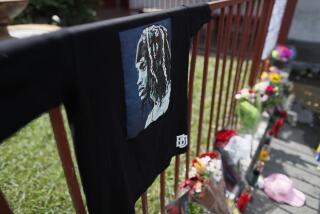His wife was murdered in Pasadena 36 years ago. Then he had to face one of her killers again

- Share via
- Tony Haro had to relive all of the awful details of his wife’s murder 36 years ago after one of the two men convicted had his conviction overturned in 2021 and was retried.
- “I know trauma lives in your body; my body just remembers everything,” he says.
The melted chocolate mint ice cream on the counter was the first sign something was wrong.

Tony Haro had just gotten home on a cool October evening in 1988 and found a note from his wife, Lois Anne Haro, saying she had left around 7 p.m. for the Pasadena Plaza to buy a gift for a friend’s baby shower the next day. The note instructed her husband not to put the ice cream back in the fridge; she was going to be right back to make an ice cream pie.
But the tub had melted completely. It was 9 p.m.
Then the nightmare began.
The melted ice cream was the first in a flood of traumatic recollections that recently washed over Tony as he sat in the front row of a courtroom gallery for the Los Angeles Superior Court retrial of Ronald Anthony Jones, one of the men who had been convicted of kidnapping, raping and murdering his wife nearly 36 years ago.
Jones and his co-conspirator, Marvin Trone, abducted Lois from the mall, then drove her around Pasadena, sexually assaulting her repeatedly in her car before taking her to a secluded area by the freeway and shooting her once in the head, killing her.
Jones was arrested the next day after he was spotted driving Lois’ car, according to trial testimony. He was found with a bullet in his jacket pocket similar in caliber to the one Lois was shot with and had gunpowder on his hands, prosecutors said. He had Lois’ credit cards, pocketbook and wallet at his house. His semen was found on her clothing at the scene.

For more than three decades, Jones sat in prison for the crimes. He challenged his conviction in state courts, but his appeals were denied. But in 2021, his murder conviction was overturned by a federal judge who found that the 1991 trial was “incurably tainted by race-based discrimination” due to the prosecution’s exclusion of Black jurors.
The prosecution was able to get rid of 12 jurors without explanation. It used four of those to exclude the only eligible Black jurors.
Jones’ trial came as race relations in Los Angeles were reaching a boiling point. Jones and his co-conspirator were Black, and their victim, Lois, was white. Jones’ trial occurred just weeks after video of the Rodney King beating was released. One of the Black jurors who was removed from the pool by the prosecution even said she had a stepson who was in the car with King before his beating.
Thirty years after he was convicted, Jones’ case was reopened. But even his current defense attorney acknowledged Jones was far from innocent.
Jones, now 54, does not deny much of what he’s accused of. He admits to kidnapping, rape and participating in Haro’s murder.
“Mr. Jones has taken responsibility for every horrific, inhumane thing that he did when he was a stupid 19-year-old man in 1988,” said Jones’ attorney, Ilya Alekseyeff, in her closing arguments to jurors Thursday.
But what he does not admit to is pulling the trigger.
At the heart of the two-week trial was the small but key detail that led to his death sentence after his conviction in 1991. Jones disputed that he was the triggerman that night, and he denied that he intended throughout the abduction to kill Haro.
“They really don’t have a case. They don’t have evidence Mr. Jones is the one who killed Ms. Haro,” Alekseyeff told jurors.
He is mostly forgotten today. But Caryl Chessman’s death penalty conviction dominated the debate about capital punishment for years.
Jones was asking the jury to find him not to have been the triggerman — one of the special circumstances allegations against him. If the jury agreed, his sentence could be reduced from capital punishment to imprisonment for 25 years to life.
“It’s a seldom seen yet sometimes highly persuasive tactic for [the] defense to admit almost all culpability,” said Josh Ritter, a defense attorney in Los Angeles not involved in the case. “The hope is that admitting culpability will garner some trustworthiness with the jurors, and that they will essentially buy into the defense theory that while he admits criminal culpability, it isn’t as far as the prosecution is alleging.”
Ritter noted that the distinction Jones’ attorney was trying to make for the jury could lead to a considerably different sentence. If Jones is not convicted of the special circumstances for being the triggerman, he could be eligible for parole. If the special circumstances are found to be true, he could receive life without parole.
“In the defense view, they are playing with house money to an extent. He has served so much time. He’s just looking for an opportunity to one day see the outside of the prison,” Ritter said.
The prosecution maintained it had proof that Jones was the shooter.
Initially, Jones denied being the shooter and claimed he was holding the gun for his accomplice, the real shooter, Trone. He also said the gunpowder found on his hands could have been from a BB gun.
But in a subsequent interview with police, Jones said he was the gunman, prosecutors said. His attorney told jurors during closing arguments that the admission was a lie.
“Mr. Jones was simply telling them exactly what they wanted to hear,” Alekseyeff said. “The prosecution did not rule out Trone as the killer.”
The jurors began deliberations Thursday, and on Monday, they returned with a verdict: guilty of first-degree murder with four special circumstances, including an enhancement of principal armed with a gun. But it could not agree on whether he was the one who shot Lois Haro, unlike in his first trial, when he was found to be the shooter and sentenced to death. Instead, he faces a mandatory sentence of life without the possibility of parole, prosecutors announced.
That’s the same sentence Trone received in 1992 after being found guilty of murder, robbery and sexual assault with special circumstances.
“Justice has finally been served for Lois Haro and her family. This verdict is a crucial step in bringing closure to a case that has weighed heavily on the hearts of her loved ones and our community for more than three decades,” Dist. Atty George Gascón said.
For his part, Tony Haro just wanted to go home.

He lives in Grants Pass, Ore., where he works as a therapist, focusing on trauma and grief. He and Lois did not have kids together, and Haro is now remarried and has two adult daughters.
“Lois’ murder turned my life upside down. The trials of Jones and Trone in the 1990s were just excruciating. It was devastating. It was hard to function,” he said while awaiting the verdict.
The retrial of Jones was different, but it still brought up all his past pain.
“I know trauma lives in your body; my body just remembers everything. So when I’m in there and the rest of the family too, we all get triggered. This is just replaying everything that happened,” he said.
When the jury found Jones guilty of first-degree murder, Haro said, Jones’ family members went up to him in the courthouse and apologized for the loss of Lois and for having to endure another trial.
“I’m very relieved,” he said, “and hope I never have go through this again in my lifetime.”
More to Read
Sign up for Essential California
The most important California stories and recommendations in your inbox every morning.
You may occasionally receive promotional content from the Los Angeles Times.











